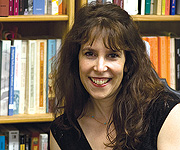Jennifer Cole, Associate Professor in Comparative Human Development
By William Harmsw-harms@uchicago.edu
News Office
 Jennifer Cole |
|
It can take years to develop an individual academic voice, but good writing is something graduate students can learn, maintains Jennifer Cole, Associate Professor in Comparative Human Development.
In a writing class for groups of eight to 10 students, Cole shows them how to take a first draft to something that becomes a true academic argument.
“I use Anne Lamott’s book, Bird by Bird: Some Instructions on Writing and Life, to show students how good writing develops,” said Cole, who is currently working with her second set of students at the dissertation writing stage.
Lamott’s book is inspired by an experience her brother had when he was challenged by a school assignment on birds. Lamott’s father advised her brother, saying, “Look, it’s just writing about one bird after another—take it Bird by Bird.”
For graduate students, the theory of writing is much the same, but the challenge is learning how to write logically so an argument emerges out of the empirical material. Writing in a clear, academic style is something that can be taught and learned, Cole said.
“I basically try to work on the structure of what they write. They bring in a wide range of writing, some even just start with field notes,” she said. “There are common ways to structure an argument, and that’s what I show them.”
Developing better writing skills continues throughout students’ academic careers, as they learn to write stronger proposals and eventually better dissertations. The dissertation can become particularly challenging, as students realize they are writing a book for the first time.
“I try to show them that they are not writing separate chapters on the same theme, but a unified piece with an argument throughout,” said Cole.
Often students can get hung up on details, and Cole uses her outside perspective to direct them toward seeing smaller concepts build out into larger ideas.
The lessons in building ideas that she teaches in writing also apply to other areas of graduate education, such as when she helps students move from gathering empirical evidence to using theory to better understand the material they have collected.
In her work, Cole, a cultural anthropologist, studies social and cultural reproduction and transformations as the processes play out in post-colonial, globalizing contexts. She has done extensive field work in Madagascar and plans to begin a study this summer of the Malagsy Diaspora in France.
Cole also teaches a theory course. “I tell them that theories are tools that illuminate some aspects of social life and obscure others. No one theory can explain everything,” she said.
Because Comparative Human Development is an interdisciplinary department, the discussions in her basic theory classes often look at issues from a variety of perspectives.
A discussion of Alzheimer’s disease led to an exploration of data from groups of individuals who discussed the impact of being married to someone with memory loss. The healthy spouses discussed how having a partner with Alzheimer’s had undermined their own sense of identity.
“That led us to discuss the contemporary literature on the theory of self. I’m an anthropologist, but I’m constantly learning from my students,” because they always bring their disciplinary backgrounds to the discussion, Cole said.
![[Chronicle]](/images/sidebar_header_oct06.gif)